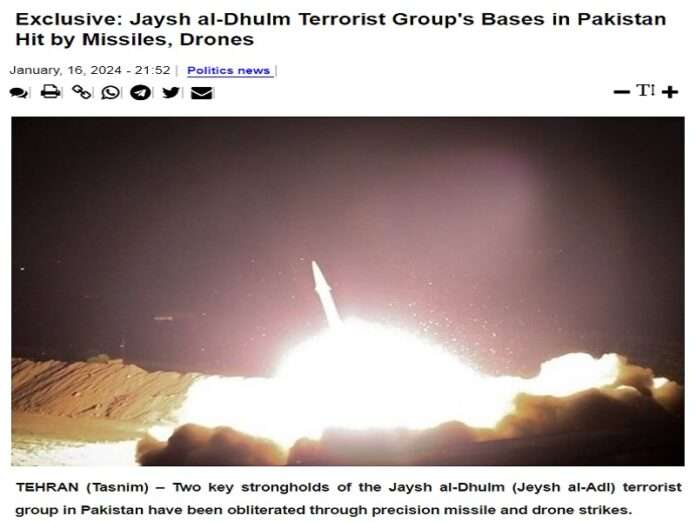Iran launched several drone and missile attacks against Jaish al-Adl (JAA) terrorist bases in the Pakistani border region of Balochistan on Tuesday as retaliation for that group’s attack last month against a police station in Iran’s border region of Sistan & Baluchestan province that killed 11 officers at the time. This came shortly after it also struck an purported Israeli spy base in Iraq’s Kurdistan region and ISIS ones in Syria in what represented Iran’s most regionally diverse anti-terrorist operation ever.
Pakistan reacted by condemning “the unprovoked violation of its airspace” that allegedly killed two kids and injured three girls, warning that it “can have serious consequences” that “will lie squarely with Iran.” They also added that “It is even more concerning that this illegal act has taken place despite the existence of several channels of communication between Pakistan and Iran.” Quite clearly, Pakistan regards Iran’s strikes as a breach of bilateral trust, but Tehran has its own side to this story.
From the Islamic Republic’s perspective, it might not have been an unlucky coincidence that last month’s terrorist attack by JAA occurred at the same time as Pakistani Chief Of Army Staff (COAS) Asim Munir’s trip to the US, which confirmed the long-running suspected rapprochement in Pakistani-US ties. April 2022’s post-modern coup against former Prime Minister Imran Khan is considered by many observers to have resulted in the reassertion of American hegemony over Pakistan in the nearly two years since then.
Despite that, Iran still sought to retain and expand pragmatic ties with Pakistan, especially due to the fact that they’re fellow Economic Cooperation Organization (ECO) members and Iran just became a full-fledged member of the SCO last year in which Pakistan has participated in the same capacity since 2017. To that end, these two tried jointly managing shared problems with terrorist-designated groups like JAA and the “Balochistan Liberation Army” (BLA) within the broader Balochistan subregion between them.
Each had traditionally accused the other of weaponizing such groups against them whether as part of their own security dilemma that’s been in place since 1979, for suspected sectarian reasons, and/or at the behest of India and the US as regards Iran and Pakistan respectively. Referencing these allegations isn’t intended to lend credence to them but simply to inform the reader of the background to the latest developments. This is arguably the most sensitive issue in bilateral relations and has been for a while.
The military impact of Iran’s anti-JAA strikes in Pakistan is much less important than the optics and timing, however, since the latter two create the impression that Tehran regards its neighbor as a serious security threat on par with the Israeli spy base in Iraq and ISIS ones in Syria that it also struck in sequence. With all three taking place as the latest Israeli-Hamas war escalates into a regional proxy war between Israel-US and Iran, the innuendo is that Pakistan is aligned with them against Tehran.
Nevertheless, Iran would have tried to address Pakistani-emanating terrorist threats through diplomacy before resorting to unilateral military action, which suggests that such efforts failed or were deemed insufficient in terms of whatever Islamabad promised to do or claimed to have already done. Iranian policymakers would have only acted as they did if they felt that Pakistan was unable or unwilling to ensure their country’s legitimate security interests and that the terrorist threat was still growing.
After all, it’s no small matter that Iran just unilaterally struck a nuclear-armed “Major Non-NATO Ally” (MNNA) of the US and fellow ECO-SCO member in spite of “the existence of several channels of communication” between them for addressing this issue, so this decision wouldn’t have been made lightly. Iran knew that it would implicate Pakistan in the eyes of the Global South as a “rogue state” that might even be operating as an American proxy in support of Israel’s Hybrid War on Iran.
From the domestic Pakistani perspective, these strikes might appear to discredit the armed forces, which were unable to deter or intercept them due to perceived incompetence and/or misplaced priorities in cracking down on former Prime Minister Khan’s PTI opposition party over nearly the past two years. Whatever the reason may be for why Pakistan couldn’t deter or intercept these strikes, the public might agitate for a response in order to uphold their country’s integrity, thus risking a dangerous escalation.
Any reciprocal strikes against Islamabad-designated terrorists-separatists inside Iran could be presented by Tehran as a false pretext for the Israeli-US duopoly to conventionally attack it by proxy, even if Pakistan only strikes uninhabited areas, whether unilaterally or after tipping Iran off ahead of time. The Global South is more likely to sympathize with Iran than with Pakistan if forced to choose between them since the first supports Palestine like the majority of the world does while the latter is a MNNA of the US.
A larger Iranian-Pakistani war is unlikely however since the latter would risk leaving itself open to a large-scale offensive by Afghan-based and Islamabad-designated TTP terrorists. India could also be enticed to strike Pakistani-based and Delhi-designated terrorists-separatists like it previously did a few times over the past decade but which Islamabad consistently denied. Pakistan might provoke a nuclear standoff in the second scenario, however, so the first is more likely since it can’t do the same if the TTP attacks it.
Looking forward, Iranian-Pakistani ties might take a long time to recover after what just happened, with the timeframe being pushed even further back in the event that Pakistan opportunistically seeks more military support from the US against Iran. The ideal scenario would be for the armed forces to prioritize anti-terrorist operations against JAA, but they don’t seem interested in that and might have even let this threat fester precisely to provoke an Iranian strike for the purpose of requesting more aid from America.








